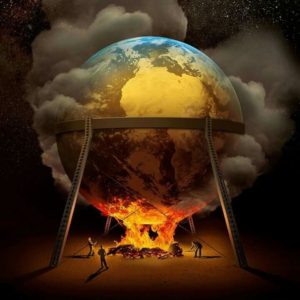 “The climate system is an angry beast, and we are poking it with sticks.”
“The climate system is an angry beast, and we are poking it with sticks.”
“All of recorded human history … has played out in perhaps the most stable climate window of the past 650,000 years. We have been shielded from the climate’s violence by our short … memory, and … remarkably good fortune. But humanity’s ongoing chemistry experiment on our planet could push the climate … into a state it hasn’t seen in tens of millions of years, a world for which Homo sapiens did not evolve.”
Herewith a brief recounting of some mild (by comparison) climate disasters that overtook past human civilizations:
“The Roman empire’s imperial power was vouchsafed by centuries of warm weather, but its end saw a return to an arid cold—perhaps conjured by distant pressure systems over Iceland and the Azores. In A.D. 536, known as the worst year to be alive, one of Iceland’s volcanoes exploded, and darkness descended over the Northern Hemisphere, bringing summer snow to China and starvation to Ireland.
“In Central America several centuries later, when the reliable band of tropical rainfall that rings the Earth left the Mayan lowlands and headed south, the megalithic civilization above it withered. In North America, a megadrought about 800 years ago made ancestral Puebloans abandon cliffside villages like Mesa Verde, as Nebraska was swept by giant sand dunes and California burned.
“In the 15th century, a 30-year drought bookended by equally unhelpful deluges brought the Khmer at Angkor low. The ‘hydraulic empire’ had been fed and maintained by an elaborate irrigation system of canals and reservoirs. But when these canals ran dry for decades, then clogged with rains, invaders easily toppled the empire in 1431, and the Khmer forfeited their temples to the jungle.
“Hopscotching through these human disasters to the present day, we pass … the Little Ice Age. Lasting roughly from 1500 to 1850, the chill made ice rinks of Dutch canals, and swelled up Swiss mountain glaciers. Tent cities sprung up on a frozen Thames, and George Washington endured his winter of cold and privation at Valley Forge in 1777 ….”
And now for the sequel: “When he coined the term mass extinction in a 1963 paper, … the American paleontologist Norman Newell posited that this was what happened when the environment changed faster than evolution could accommodate.” The environment is changing very fast. And because it is, that could be the fate of most life on this planet. Including us.
I’m not saying we should do anything about it. Politics and generational selfishness precludes that. All I’m saying is, it’s been nice knowing you. And don’t have kids.
Read article here.
Most of the examples given are from when the climate cools. Suddenly it becomes more difficult to feed a population. A warming may bring about change, but that change may bring more land into production. Or allow agriculture to continue.
That’s an extremely superficial view of things. Few if any scientists would agree that climate change benefits agriculture. Wikipedia sums up the adverse effects as follows: “Climate change will impact agriculture and food production around the world due to the effects of elevated CO2 in the atmosphere; higher temperatures; altered precipitation and transpiration regimes; increased frequency of extreme events; and modified weed, pest, and pathogen pressure. Climate change is projected to negatively affect all four pillars of food security: not only how much food is available, but also how easy food is to access (prices), food quality and how stable the food system is.” (Go here and follow the links for more details.)